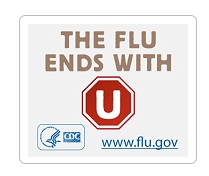What is Influenza?
Influenza also known as the “Flu” is a highly contagious (easily spread) respiratory disease that infect the nose, throat, and lungs. Symptoms can include:
- Cough
- Body aches
- Fever/chills
- Sore throat
- Headaches
Even if you are healthy, you can get the flu. The flu can cause serious health problems and life-threatening complications, particularly in infants and young children, elders, and those with chronic illness or weakened immune systems, and pregnant women. More than 200,000 people end up in the hospital each year due to the flu.
How do people get the flu?
The flu spreads through the air when an infected person sneezes, coughs, or speaks. The flu can also be passed on to objects or surfaces that someone with the virus touched, sneezed, or coughed on. When a healthy person touches these and then touches his or her mouth or nose, the virus can enter their system.
How do you prevent getting the flu?
The best way to prevent the flu is to get a flu vaccine every year if you are 6 months old or older. Protection from last year’s flu vaccine wears off, so to be fully protected you to need to be vaccinated for the current flu season, as soon as the vaccine becomes available in your community.
Why do I need to get a flu shot?
The flu can cause serious health problems such as sinus infections, ear infections or pneumonia. If you get a flu vaccine, you protect yourself from getting sick and your family and friends. Almost 20% to 30% of people carrying the influenza virus have no symptoms.You could be infected 1 day before symptoms develop and spread the virus for up to a week after becoming sick. The flu can be life threating to babies and elders, so you can protect them by getting a flu vaccination and stopping the disease.
Remember you need to get your flu shot every year!
Resources



